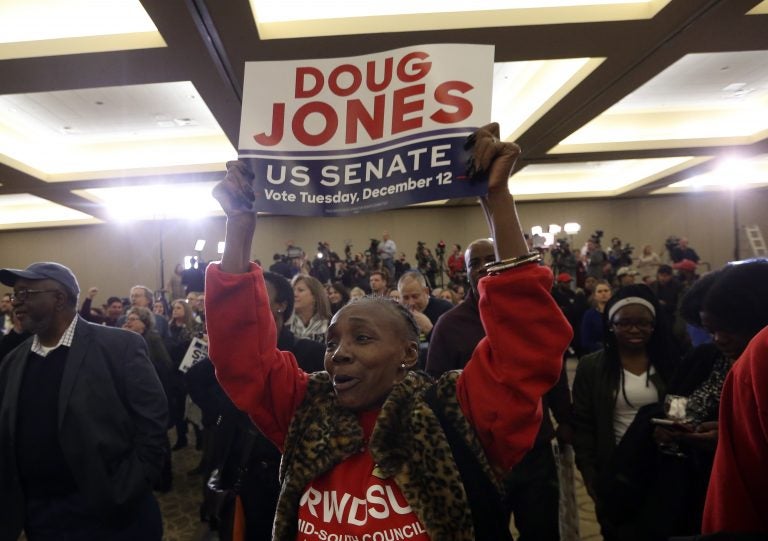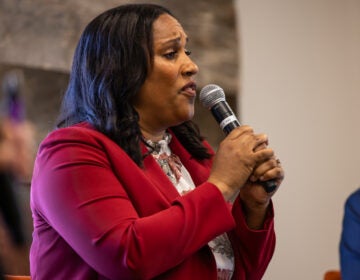A joyous holiday gift from the black women of Alabama
If not for their fervent opposition, a credibly accused child molester and racist homophobic theocrat would be on his way to the United States Senate.

A supporter of Democratic candidate for U.S. Senate Doug Jones what for results during an election-night watch party Tuesday, Dec. 12, 2017, in Birmingham , Ala. Jones defeated Republican Roy Moore. (AP Photo/John Bazemore)
Before we bid goodbye to this week’s stunning election, let’s put our hands together for the black women of Alabama. If not for their fervent opposition, a credibly accused child molester and racist homophobic theocrat would be on his way to the United States Senate.
Roy Moore lost the race by 1.5 percentage points. Black women, who comprised 17 percent of Tuesday’s electorate, rejected him by a margin of 96 percentage points. That’s no typo. They chose Democrat Doug Jones, 98 to 2. It’s no exaggeration to say that they rescued Alabama — and us — from the most despicable mutation of Trumpism.
We owe them a debt of gratitude because the white voters of Alabama — both genders, by strong majorities — were perfectly fine with putting Moore in power. But let us not ponder that nauseating fact. Let us simply smile in satisfaction that the unanticipated turnout surge of black women (with a lesser assist from black men) showed us the best of this country. In the words of black activist Stefanie Brown James, they were able to “decide if the next senator from the state (was) going to be a person in the tradition of George Wallace, or who literally stood against the Klan to bring justice to all of black America.”
Wallace, of course, was the racist Alabama governor who stood in the schoolhouse door to bar blacks from entering; Roy Moore, his latter-day spawn, voiced nostalgia for the slavery era and said America would be better off without the constitutional amendment that guarantees equal protection of the law. Whereas Doug Jones prosecuted Klan members who bombed a black church and killed black children. That contrast alone guaranteed that Moore would lose big in the black community.
But nobody predicted that black turnout (29 to 30 percent of the Tuesday electorate) would exceed their share of the Alabama population (roughly 25 percent). The surge happened because Moore’s antebellum racism was just one of many critical issues.
For starters, Moore was endorsed by Trump, who’s in cahoots with congressional Republicans who want to cripple Obamacare, shred the federal safety net, and undercut public education. DeJuana Thompson, a black political strategist, says: “When you have rhetoric coming out about possible pedophilia, and when you’ve got rhetoric coming out about slashing critical resources to education and the programs that help sustain homes in the African-American community, black women are always going to show up for their communities.”
That’s also what happened in last month’s Virginia gubernatorial election, where black women comprised 12 percent of the electorate and opposed Trump-endorsed Republican Ed Gillespie by a margin of 91 percent to 8. Gillespie was badly beaten, losing to Democrat Ralph Northam by 9 points, so it’s a stretch to say that black women were decisive. But with help from black men (9 percent of the Virginia electorate, favoring Northam, 81-17) they turned the Democratic win into a blowout.
But as DeJuana Thompson said, they did this for themselves, for their own communities. They did it for self-preservation. They did not sink Roy Moore to do whites a favor; as “Daily Show” correspondent Dulce Sloan quipped the other night, “No black woman cast her vote going, ‘This one’s for Scott!'” This week, rescuing America from the abyss was merely a side benefit. But we’ll take it.
And in return, we should give them the attention they deserve. Democrats have been fixated on wooing the white working-class men who’ve been bailing on the party since the late ’60s; in a perfect Democratic world, it would be great to get them back. But what happened this week in Alabama, and last month in Virginia, and in most races in recent decades (including Hillary Clinton’s popular vote win), should be enough to remind Democrats that black women are their most loyal constituency, worthy of further nurturing.
As Kamala Harris, the California senator and potential presidential candidate, tweeted on Wednesday, “Let’s address issues that disproportionately affect Black women — like pay disparity, housing & under-representation in elected office.” It’s the very least we can do, as Roy Moore rides his horse into the sunset.
—
On another front, it’s no secret by now that Trump has tried to pack our government with mediocrities. But his federal court nominees have been the worst of all. For every Neil Gorsuch, who at least had credentials prior to his high court ascent, there have been nominees with zip credentials. One guy, recently tapped by Trump for a lifetime federal judgeship with Alabama, was compelled to withdraw his name this week because even Republican senators were discomfited by the fact that he’d only been a lawyer for three years and had never tried a case.
But in a Senate Judiciary Committee hearing yesterday, we got la piece de resistance.
Trump has nominated, for a lifetime judgeship on the federal court in Washington, D.C., a guy named Matthew Peterson. Here’s an excerpt of his exchange with Republican Sen. John Kennedy of Louisiana.
Kennedy: “Have you ever tried a jury trial?”
Petersen: “I have not.”
Kennedy: “Civil?”
Petersen: “No.”
Kennedy: “Criminal”
Petersen: “No.”
Kennedy: “Bench?”
Petersen: “No.”
Kennedy: “State or federal court?”
Petersen: “I have not.”
Kennedy: Are you familiar with the “Daubart standard?” (Which judges commonly use to assess the value of expert testimony.)
Petersen: “I don’t have that readily at my disposal.”
Kennedy: Do you know what a “motion in limine” is? (A common legal term, where lawyers ask judges to rule on the admissibility of evidence.)
Petersen: “I would probably not be able to give you a good definition right here at the table.”
That’s enough. I can’t even.
WHYY is your source for fact-based, in-depth journalism and information. As a nonprofit organization, we rely on financial support from readers like you. Please give today.




